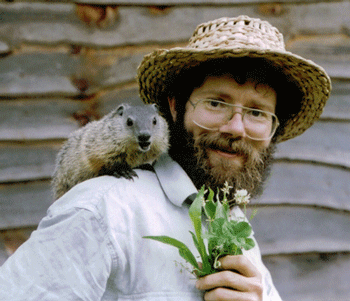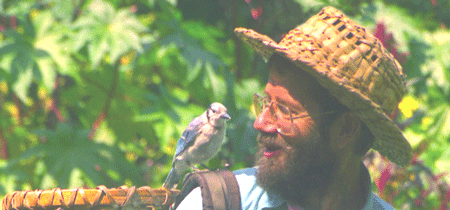Press Play to hear Doug Elliot talk about using storytelling to support nature based education on the Art of Storytelling with Brother Wolf.
 |
|
||||
Doug Elliot Writes…
How do you find a story in nature (or anywhere else for that matter)? I often start with an incident, an encounter, a problem or a question-something happens to you, you meet someone, see something, or you wonder about something. The narrative I tell is my journey of investigation, trying to figure it out.
The incident is your hook, not only to your listeners when you’re storytelling, but also to yourself as an explorer and an investigator. Then I let my curiosity be my guide. I start asking questions. Any journalist will tell you your ability to get a good story is often directly related to your ability to ask good questions. The first and probably the ultimate resource is yourself. How do/did I relate to that incident, encounter, problem or question? How did I feel?
The next step might be an initial resolution concerning your opening incident or a preliminary answer to the question you have set up.
Simply seeing or experiencing something and figuring out what it is can be an interesting vignette, but it’s rarely enough to make a good story. This initial vignette (incident, encounter, problem or question) becomes what Joseph Campbell refers to as the “call to adventure.” Your challenge becomes how to find and tap those “ripples on the surface of life” that Campbell writes about “which reveal hidden springs as deep as the soul itself.”
After you’ve explored your feelings and reactions and probed your own background, you find others who might have something to say about what you’re investigating. This subsequent investigation-your reading, research, and your conversations with other people-becomes the adventure, the backbone or plot line of the narrative. Some of the various bits of information you gather or anecdotes and tales you hear can possibly stand on their own, but ideally the stories and information will be used as sub-plots to develop your entire piece. Then, instead of delivering a natural history lecture, you end up with a classic mythic hero’s journey, where the hero (you, most likely) answers the “call to adventure.” Wherever the investigation takes you becomes the journey. These facts, tales, and lore become stepping stones on a quest in search of truth and meaning. Rather than delivering a bunch of facts about a critter, phenomenon, or situation, you tell a story.
Bio
Doug Elliott has performed and presented programs at festivals, museums, botanical gardens, nature centers and schools from Canada to the Caribbean. He has been a featured storyteller at the National Storytelling Festival in Jonesborough TN. He has lectured and performed at the American Museum of Natural History in New York, the Royal Ontario Museum in Toronto and conducted workshops for the Smithsonian Institution. He has led ranger training sessions for the National Park Service and guided people in the wilderness from down-east Maine to the Florida Everglades.
He was named harmonica champion at Fiddler’s Grove Festival in Union Grove NC. He is the author of four books, many articles in regional and national magazines and has recorded a number of award-winning albums of stories and songs.
Elliott’s passion for the natural world developed in early childhood roaming the woods and waters around his home. His dad used to say, “That boy knows what’s under every rock between here and town.”
He still roams the woods today. He has traveled from the Canadian North to the Central American jungles studying plant and animal life and seeking out the traditional wisdom of people with intimate connections to the natural world. And he still looks under rocks. These days he uncovers more than just a few strange critters; he brings to light the human connection to this vibrant world of which we are a part.



#1 by stewart zobian on November 28, 2009 - 11:20 pm
Quote
I like writting short stories. With storytelling i know that i would be scayed to be up in front of a crowd of people.
Pingback: StoryTelling « Eros Philia Agape